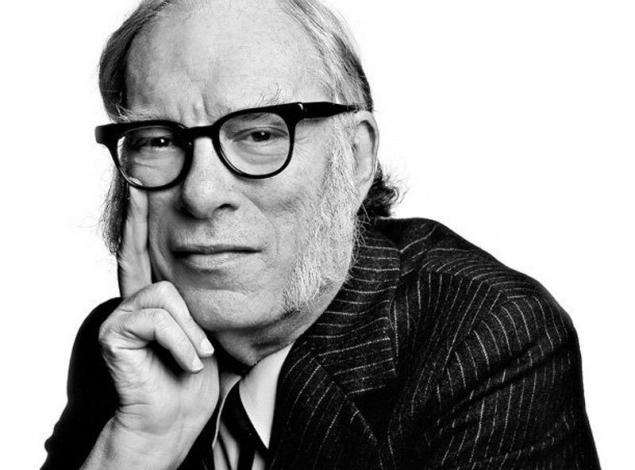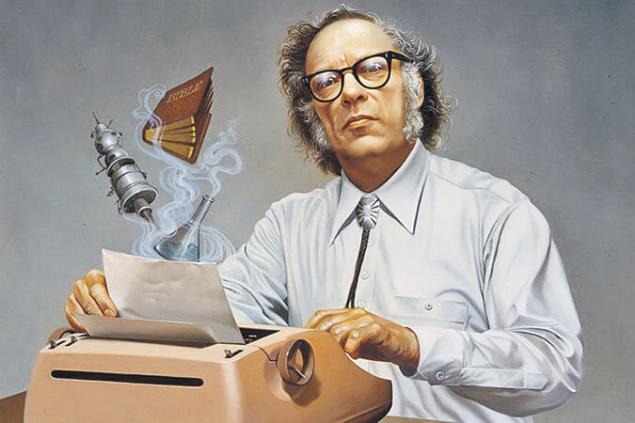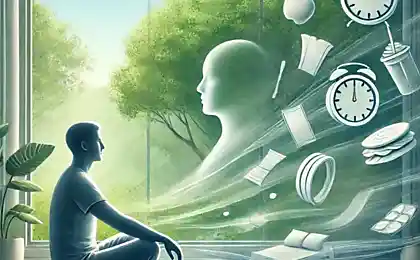589
Isaac Asimov: Success can be engineered
I always wonder how creative people materialize their great ideas.
Where, for example, writers get stories of books that are read in the millions? How they manage not to lose the taste for creativity, when it becomes a daily monotonous work? As they live in valleys? How do you work with doubt?
I recently read an essay by Charles Chu, in which he analyzed the autobiography of writer Isaac Asimov, one of the pillars of the world of science fiction, author of hundreds of books.

It seemed to me that six methods of the strategy of the writer, which are considered in this study is useful not only to people working with the word, but every one of us.
Where to draw ideas? How to deal with creative crisis and to overcome the fear? How to overcome perfectionism and to bring the idea to life? Want in your field to achieve success comparable to the achievements of Asimov? Then look to the techniques of the writer and to incorporate them into your workflow.
I offer you my translation of this article.
If you need to describe Isaac Asimov in one word, it would be "prolific".
To catch up with Asimov number written novels, essays, letters and other manuscripts, you'll need to release a full novel every 2 weeks for 25 years.
How is it that while some of us implement 1-2 ideas in your whole life, Asimov brought so many extraordinary ideas?
To understand this, I studied the biography Asimov "It was a good life."
People are not born able from childhood to work on drafts for 8 hours a day, 7 days a week. Isaac Asimov is no exception. He tore the page, disappointed, failed again and again, but never stopped.
In his autobiography, Asimov shared his strategy on how to never run out of stock ideas.

1. Don't stop learning
Asimov was not only a writer of fiction. He received his doctorate in chemistry at Columbia University, wrote the scientific works on physics, of ancient history and even wrote a book on the Bible.
How he was able to work on a variety of topics, while all seek to narrow specialization?
Unlike some "professionals", Asimov did not stop to learn and after receiving a degree.
"I could not have written a number of books based only on the knowledge received in school. I dedicated my time to self-education. My library of reference materials grew, and I had a long time to pore over them in constant fear that I could not properly understand the concept that a person versed in the subject, would have seemed ridiculous".
To generate good ideas, you also need to absorb good ideas. A diploma is not the end, it's a start.
Growing up, Asimov read everything...
"This variety of reading is the result of lack of leadership, but it left an indelible mark. I was interested in 20 directions, and all these interests have remained to this day. I wrote books on mythology, the Bible, Shakespeare, history, science and other things."
Do not limit yourself to one theme. Follow your curiosity. And don't stop to invest in yourself.
2. Don't fight with stuporit is Nice to know as well as I, Asimov were times stupor.
"Often working on a sci-Fi novel, I caught myself thinking that fed up and just not able to write even one word."
Crisis — this is normal. Response to the situation — that's what distinguishes the professional from the Amateur.
Asimov didn't let the screeching halt to stop himself. Years later he developed a strategy...
"I don't Balk at a blank sheet of paper and not scratching their heads day and night, and so if it is empty. Instead, I put the novel and start another project. Working on an editorial, essay, short story or on one of the non-fiction books. By the time I get tired of new challenges, the head is again able to function at full capacity and to return to the old task. I'm going back to writing and everything again, it turns out without Herculean effort."
While working on this article, at one point I was so disappointed in the result that has cast her in two weeks and doing another project. After I digress, the work went back.
Our brain works in mysterious ways. Should we be distracted, to do another project and to deliberately ignore something, our subconscious mind finds ground for development ideas.
3. Beware of the resistance ofthe Representatives of creative professions — entrepreneurs, writers, artists familiar fear associated with the implementation of ideas. Once we implement the idea, it is forever open to criticism of millions of people.
Sometimes, after I publish an article, I'm so nervous that I avoid reviews and even e-mail.
This fear is the worst enemy of creativity. In the book "the War for creativity. How to overcome internal barriers and to begin to create" Stephen Pressfield gives the name of this fear — resistance.
Asimov also familiar with the resistance.
"The writer is required to overcome uncertainty as he writes. This sentence that I just wrote, make sense? This is the best form, to Express what I wanted? Would it sound better if you write differently? That is why a writer often revises his work, something changes, something reduces and always tries different ways to Express the idea. And as far as I know, never fully satisfied."
Self-doubt is the enemy.
I am a relentless editor. This article I changed probably a dozen times and still not happy with the result. At one point you need to stop, otherwise the material will never be published.
Fear of rejection makes us perfectionists. But this perfectionism — shell. We use it only when we are hard. It gives a sense of safety... security at the expense of lies.
The truth is that we all have ideas, little seeds of creativity. The difference between us and Isaac Asimov is that we reject ideas without even trying to realize them.
In the end, the lack of ideas means that we will not fail.
4. Lower the barAsimov was the enemy of perfectionism. Try to do everything perfectly the first time, he said, is a big mistake. Initially focusing on the basics.
"Think of yourself as a painter who first makes a sketch to a clear understanding of composition. Then taken for color, balance and everything else. By doing this, it's time for niceties".
Don't try to write the Mona Lisa in one sitting. Reduce the bar. Take a test product, an outline or raw model.
At the same time, Asimov talks about how important self-confidence.
"The writer has no right to wallow in doubt about the quality of his writing. He must love what he writes. I love you".
Believe in what you create. This does not mean that it is necessary to make the best product in the world every time, sitting. True confidence is expressed in the attempt to expand the boundaries, fail, and still have the strength to rise.
We suffer setbacks, struggle. And therefore are winning.
5. Create moreAs a means of combating perfectionism Azimov encouraged to create.
"By the time the book arrives in stores, the writer has no time to worry about that it will not participate or will low sales. By this time he had already sold several books and is working on a new one. And that's all that was bothering him. This work stream supports the peace of mind."
If every week you release a new product, you simply have no time to dwell on the failures.
So I try to write a few articles a week, instead of focusing on creating one, but "perfect".
Diversity — insurance for your mind.
6. The secret sauceis a Writer and friend of Asimov once asked him: "Where do you get ideas?"
Asimov replied, "I Think and think and think until until you're ready to kill yourself... You think, ideas come easy?"
Many nights he spent alone. Nobody says that to find ideas easily. published
The author of the translation: Lera Petrosyan
P. S. And remember, only by changing their consumption — together we change the world! ©
Source: interesno.co/myself/6347eb150a26
Where, for example, writers get stories of books that are read in the millions? How they manage not to lose the taste for creativity, when it becomes a daily monotonous work? As they live in valleys? How do you work with doubt?
I recently read an essay by Charles Chu, in which he analyzed the autobiography of writer Isaac Asimov, one of the pillars of the world of science fiction, author of hundreds of books.

It seemed to me that six methods of the strategy of the writer, which are considered in this study is useful not only to people working with the word, but every one of us.
Where to draw ideas? How to deal with creative crisis and to overcome the fear? How to overcome perfectionism and to bring the idea to life? Want in your field to achieve success comparable to the achievements of Asimov? Then look to the techniques of the writer and to incorporate them into your workflow.
I offer you my translation of this article.
If you need to describe Isaac Asimov in one word, it would be "prolific".
To catch up with Asimov number written novels, essays, letters and other manuscripts, you'll need to release a full novel every 2 weeks for 25 years.
How is it that while some of us implement 1-2 ideas in your whole life, Asimov brought so many extraordinary ideas?
To understand this, I studied the biography Asimov "It was a good life."
People are not born able from childhood to work on drafts for 8 hours a day, 7 days a week. Isaac Asimov is no exception. He tore the page, disappointed, failed again and again, but never stopped.
In his autobiography, Asimov shared his strategy on how to never run out of stock ideas.

1. Don't stop learning
Asimov was not only a writer of fiction. He received his doctorate in chemistry at Columbia University, wrote the scientific works on physics, of ancient history and even wrote a book on the Bible.
How he was able to work on a variety of topics, while all seek to narrow specialization?
Unlike some "professionals", Asimov did not stop to learn and after receiving a degree.
"I could not have written a number of books based only on the knowledge received in school. I dedicated my time to self-education. My library of reference materials grew, and I had a long time to pore over them in constant fear that I could not properly understand the concept that a person versed in the subject, would have seemed ridiculous".
To generate good ideas, you also need to absorb good ideas. A diploma is not the end, it's a start.
Growing up, Asimov read everything...
"This variety of reading is the result of lack of leadership, but it left an indelible mark. I was interested in 20 directions, and all these interests have remained to this day. I wrote books on mythology, the Bible, Shakespeare, history, science and other things."
Do not limit yourself to one theme. Follow your curiosity. And don't stop to invest in yourself.
2. Don't fight with stuporit is Nice to know as well as I, Asimov were times stupor.
"Often working on a sci-Fi novel, I caught myself thinking that fed up and just not able to write even one word."
Crisis — this is normal. Response to the situation — that's what distinguishes the professional from the Amateur.
Asimov didn't let the screeching halt to stop himself. Years later he developed a strategy...
"I don't Balk at a blank sheet of paper and not scratching their heads day and night, and so if it is empty. Instead, I put the novel and start another project. Working on an editorial, essay, short story or on one of the non-fiction books. By the time I get tired of new challenges, the head is again able to function at full capacity and to return to the old task. I'm going back to writing and everything again, it turns out without Herculean effort."
While working on this article, at one point I was so disappointed in the result that has cast her in two weeks and doing another project. After I digress, the work went back.
Our brain works in mysterious ways. Should we be distracted, to do another project and to deliberately ignore something, our subconscious mind finds ground for development ideas.
3. Beware of the resistance ofthe Representatives of creative professions — entrepreneurs, writers, artists familiar fear associated with the implementation of ideas. Once we implement the idea, it is forever open to criticism of millions of people.
Sometimes, after I publish an article, I'm so nervous that I avoid reviews and even e-mail.
This fear is the worst enemy of creativity. In the book "the War for creativity. How to overcome internal barriers and to begin to create" Stephen Pressfield gives the name of this fear — resistance.
Asimov also familiar with the resistance.
"The writer is required to overcome uncertainty as he writes. This sentence that I just wrote, make sense? This is the best form, to Express what I wanted? Would it sound better if you write differently? That is why a writer often revises his work, something changes, something reduces and always tries different ways to Express the idea. And as far as I know, never fully satisfied."
Self-doubt is the enemy.
I am a relentless editor. This article I changed probably a dozen times and still not happy with the result. At one point you need to stop, otherwise the material will never be published.
Fear of rejection makes us perfectionists. But this perfectionism — shell. We use it only when we are hard. It gives a sense of safety... security at the expense of lies.
The truth is that we all have ideas, little seeds of creativity. The difference between us and Isaac Asimov is that we reject ideas without even trying to realize them.
In the end, the lack of ideas means that we will not fail.
4. Lower the barAsimov was the enemy of perfectionism. Try to do everything perfectly the first time, he said, is a big mistake. Initially focusing on the basics.
"Think of yourself as a painter who first makes a sketch to a clear understanding of composition. Then taken for color, balance and everything else. By doing this, it's time for niceties".
Don't try to write the Mona Lisa in one sitting. Reduce the bar. Take a test product, an outline or raw model.
At the same time, Asimov talks about how important self-confidence.
"The writer has no right to wallow in doubt about the quality of his writing. He must love what he writes. I love you".
Believe in what you create. This does not mean that it is necessary to make the best product in the world every time, sitting. True confidence is expressed in the attempt to expand the boundaries, fail, and still have the strength to rise.
We suffer setbacks, struggle. And therefore are winning.
5. Create moreAs a means of combating perfectionism Azimov encouraged to create.
"By the time the book arrives in stores, the writer has no time to worry about that it will not participate or will low sales. By this time he had already sold several books and is working on a new one. And that's all that was bothering him. This work stream supports the peace of mind."
If every week you release a new product, you simply have no time to dwell on the failures.
So I try to write a few articles a week, instead of focusing on creating one, but "perfect".
Diversity — insurance for your mind.
6. The secret sauceis a Writer and friend of Asimov once asked him: "Where do you get ideas?"
Asimov replied, "I Think and think and think until until you're ready to kill yourself... You think, ideas come easy?"
Many nights he spent alone. Nobody says that to find ideas easily. published
The author of the translation: Lera Petrosyan
P. S. And remember, only by changing their consumption — together we change the world! ©
Source: interesno.co/myself/6347eb150a26























